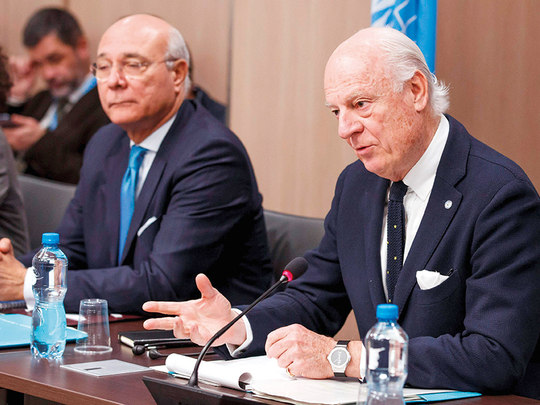
Despite serious fears it would not happen, the second half of eight round of Geneva talks started on Monday, aimed at reaching a breakthrough before Christmas.
The regime delegation delayed confirming its participation until the very last minute, after skipping the opening day of the first round on November 28. Expectations are low, by all accounts, due to one specific demand of the Syrian opposition: After wrapping up a conference in Saudi Arabia last month, it insisted on the departure of Bashar Al Assad.
Although they put it as a goal rather than a precondition, Damascus maintains this ought to be scrapped completely for any progress — a view shared publicly by Moscow and Tehran, and implicitly by former allies of the opposition, like Washington and Ankara, who have both surrendered to the Russian vision of the Syrian endgame, and are seemingly no longer interested in regime change in Damascus. Turkish President Recep Tayyip Erdogan has been cosying up to the Russians while US President Donald Trump has suspended all military aid to the armed opposition, satisfying himself only with the destruction of Daesh, empowerment of the Kurds, and the eventual clipping of Iranian and Hezbollah wings in Syria.
“After eight rounds? I doubt the talks will go anywhere,” said Adib Al Shishakly, a ranking veteran of the Syrian opposition. He added: “The regime and its allies were [simply] buying time, and they succeeded in doing so.”
In the previous seven rounds of talks in Geneva, the government delegation has insisted that no early presidential elections will happen and that Al Assad is entitled to run for a third round when his present tenure ends in 2021. The opposition delegation, headed by former parliamentarian Nasr Hariri, maintains the need for a Transitional Government Body (TGB) that assumes full presidential powers from Al Assad ahead of the transition period. “This is a red line that Damascus will never accept, and nor would the Russians or the Iranians,” said Amer Elias, a Damascus-based analyst and member of the Baath party. Speaking to Gulf News, he added: “What can be negotiated are parliamentary elections monitored by the United Nations and constitutional reforms, in addition to presidential ones where anybody can run against President Al Assad.”
Presently being debated at Geneva is a constitutional draft that Russian lawmakers presented back in 2016, which dilutes some presidential powers, like naming the governor of the Central Bank, but keeps him in charge of all security and military affairs. The draft drops the word ‘Arab’ from the name of the country, and all mention of the president’s religion, enabling a non-Muslim to run for office. These two points have raised the ire of Islamists and Baathists alike, who are lobbying for their amendment.
The draft also encourages ‘local councils’ in different parts of Syria, which would automatically apply to Kurdish territories, if passed. Residents would get to name their own councils, elect their own municipalities and governor (without having to await approval or appointment from Damascus) and get a share of their region’s wealth. Speaking from Moscow earlier this year, Foreign Minister Walid Al Mua’alem said some form of limited autonomy for the Kurds was ‘negotiable’.
During the last round of Geneva in late November, UN Special Envoy Staffan de Mistura presented a document of basic principles to the two Syrian delegations. It stressed the need for a sovereign and united Syria, free from any foreign tutelage, run by a democratic government that respects all ethnicities and minorities. He also stressed the need to uphold all state institutions, a point shared by both parties. The opposition delegation responded with its own 12-point paper, which made no reference to Al Assad’s departure but called for reforming the armed forces and security services — also dropping the word ‘Arab’ in order to satisfy Kurdish aspirations. The regime delegation refused to present a paper saying it had already handed its roadmap to De Mistura’s predecessor, Lakhdar Brahimi, nearly four years ago. That document called on the international community to lift sanctions, stop the flow of arms to the armed opposition, and “support the Syrian army and its allies” in their ‘war on terror’. It made no reference whatsoever to a political process, and said nothing about elections, either presidential or parliamentary.
“Syria will never achieve stability so long as Bashar is in power; there will be no stability before a full political transition happens,” added Al Shishakly, noting, “We cannot trust a regime that starved 400,000 people in Ghouta.” Elias, the Baath party member, told Gulf News: “The fate and future of the Syrian President is not up for negotiations, either at Geneva or elsewhere. The opposition needs to understand that before any progress happens. It needs to be removed from the negotiating table altogether.” He added: “What’s important now is to maintain the tripartite alliance of Russia, Turkey, and Iran. Astana jumpstarted the Geneva process that was frozen last January. The international community needs to keep up the momentum at Geneva, fearing that if it collapses, the Russians will take the issue to Sochi [the Black Sea resort where Russia plans to hold a ‘national dialogue’ conference in early 2018]. For now the Russians are still letting Geneva happen to keep the political process within the framework of the international community, and under the auspices of the United Nations.”












